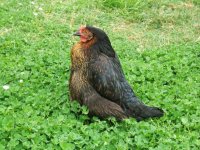A
Anonymous
Guest
One of our hens has been poorly for a couple of months. She has an abnormal posture, more like a penguin than a hen, with her bottom drooping and her head hunched. We thought she had diarrhea, but the vet said she was OK. She has been treated for worms, and even had antibiotics (Métoxyl) in case of coccidiosis. All to no avail, and her bottom is sore and needs bathing, and she is losing feathers. But she eats and waddles (slowly) around, but can't get on her perch at night.
Any advice very welcome - we are new to this. One of our hens died two days ago - we think it was the effort involved in laying a (large) egg. Is there anything we can do to avoid this? Our hens are quite young, about 8 months old.
Any advice very welcome - we are new to this. One of our hens died two days ago - we think it was the effort involved in laying a (large) egg. Is there anything we can do to avoid this? Our hens are quite young, about 8 months old.

